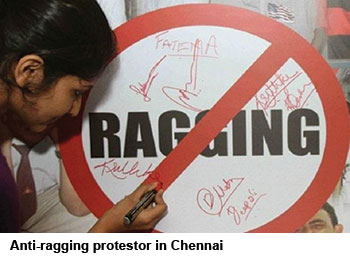 Despite a stringent law against ragging in Tamil Nadu (pop.72 million) and a slew of directives issued by the Supreme Court to state governments and educational institutions countrywide to curb the practice of ragging, this pernicious campus initiation ritual has not been eradicated. Persistent fear, threat of violence and abuse continue to stalk school-leavers entering Tamil Nadu’s 69 universities and over 2,000 undergrad colleges.
Despite a stringent law against ragging in Tamil Nadu (pop.72 million) and a slew of directives issued by the Supreme Court to state governments and educational institutions countrywide to curb the practice of ragging, this pernicious campus initiation ritual has not been eradicated. Persistent fear, threat of violence and abuse continue to stalk school-leavers entering Tamil Nadu’s 69 universities and over 2,000 undergrad colleges.
On August 20, second year students of the School of Excellence in Law (SOEL), Chennai — a premier government law institute affiliated with the Tamil Nadu Dr. Ambedkar Law University (TNDALU) — were allegedly ragged and assaulted by third year students. Parents of one of the students K.K. Prasanth whose shoulder was dislocated in the incident, filed a police complaint against six students for assault and bodily harm. Moreover, a separate complaint was filed by a second year student against a senior who had forced him to drink urine from a beer bottle. The ragging incidents also brought to light the torment second year students were subjected to from the time they joined the college in 2017.
Following the assault not only on freshers but also second year students, a five-member inquiry committee headed by Tamma Suryanaryana Sastry, vice chancellor of TNDALU, was constituted on August 24. The committee recommended suspension of the two senior students who had assaulted Prasanth and establishment of a five-member permanent disciplinary committee within SOEL to adjudicate student and teacher complaints. Narayana Perumal, director of SOEL who claimed the incident was a scuffle between student gangs, and not ragging, resigned his office on September 3, following allegations of bias in his preliminary report.
Moreover, responding strongly to the incident at SOEL, an anti-ragging committee meeting convened by Tamil Nadu governor and chancellor of TNDALU, Banwarilal Purohit, which also included state higher education minister, K. Anbazhagan and other top-level government officials, discussed sterner measures to punish students guilty of ragging. The pros and cons of penalising offenders by declaring their involvement in ragging incidents in their degree and transfer certificates was also discussed.
Other recommendations of the Sastry Committee were that all higher education institutions should establish anti-ragging committees and send compliance reports to a state-level monitoring cell; inclusion of the regional joint director of higher education in district monitoring committees; ensuring that every district cell headed by the collector and the superintendent of police holds review meetings at the start of every academic year, and inclusion of stakeholders from civil society in district and state-level anti-ragging committees.
However, students and educationists remain unimpressed by this “knee-jerk reaction” of the state government to the latest ragging incident because several of these recommendations to root out this cruel campus initiation rite already exist on the statute books. For instance, the Tamil Nadu Prohibition of Ragging Act, 1997, prescribes strict punishment for violators of the provisions of the Act. Yet, according to Union ministry of human resource development (HRD) data, the number of ragging incidents in the state has risen from 25 in 2015 to 43 in 2017.
Moreover, they take pains to highlight the Supreme Court’s ban on ragging way back in 2001, and appointment of the Unnikrishnan Committee to set out guidelines for colleges to stamp out this menace. Again on May 16, 2007, the apex court issued strict orders to higher education institutions and state governments to visit criminal punishment on ragging offenders after studying a detailed report comprising 50 recommendations submitted by the R.K. Raghavan Committee constituted in December 2006 by the HRD ministry under the court’s direction. Despite these stern injunctions, this sadistic ritual continued, forcing the Supreme Court to issue a slew of supplementary anti-ragging directions on May 8, 2009.
Informed educationists, parents and students ascribe the persistence of this cruel initiation rite to pusillanimous institutional managements ever ready to ignore or suppress ragging which often inflicts heavy psychological damage on young school-leavers entering tertiary education, sometimes driving them to severe self-harm and suicide, to fear of losing their institutional reputation. All too often, they trivialise damaging ragging incidents as harmless pranks, and discourage victims from filing official complaints.
“Students indulging in ragging should be seen as what they are — aggressive and violent hoodlums who use force to establish notional superiority over juniors. It’s the duty and moral responsibility of college and university managements to create congenial environments by encouraging senior students to welcome and mentor incoming juniors. Anti-ragging committees comprising faculty members should be vigilant and monitor activities of students at all times and CCTV cameras should be installed to apprehend and severely punish the culprits. Exemplary punishment should be repeatedly meted out to perpetrators to stamp out this vicious practice,” says Dr. R. Sridhar, professor and head of the department of pulmonary medicine at the Stanley Medical College, Chennai.
This is good advice. The managements of India’s 39,000 colleges and almost 900 universities need to strengthen their collective responsibility and stand up to spoilt brats and bullies intent on damaging young lives and destroying often carefully nurtured institutional reputations.
Hemalatha Raghupathi (Chennai)

























